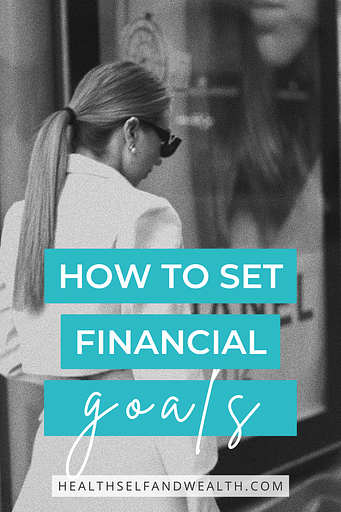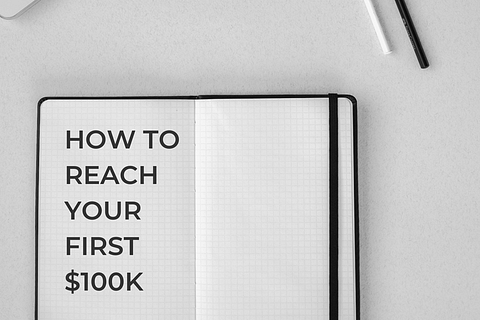
“If tomorrow morning you woke up with $1 million in your bank account, how would you spend your time going forward?”
When I was asked this question several years ago, I played out several scenarios in my mind.
- Would I retire at the beachside and spend my days writing, relaxing, and doing yoga?
- Would I take my family on an extended trip to Europe?
- Would I start my own business?
Ultimately I said, “I would take some time off, travel and write while spending quality time with my family. Then, I would start a business.”
The person responded with, “That’s great! Do you really need a million dollars to do that though? Is there any way you could make it happen sooner?”
If I asked you the million dollar question today, what would you say about how you would spend your time?
Your answer to that question is the first step in how to set financial goals.
It turns out, I didn’t need a million dollars in my bank account to pursue those dreams. One year later I started my first endeavor: a business centered around my writing with a mission of helping women earn financial freedom. You know it as Health Self and Wealth.
Please note I am not a licensed financial advisor. This information is for education purposes only. Every person has a unique financial situation. The best approach will be different for everyone. Accordingly, do your own due diligence before making any financial decision.
Health Self and Wealth Philosophy
At Health Self and Wealth, we believe achieving financial goals should never come at the expense of your happiness today. That said, we do our best to use balanced approaches when it comes to managing personal finances.
Our philosophy is that the whole point of having money is it has the power to make your life better. It provides you with financial stability, which can give you peace of mind. It provides you with the financial means to live your best life. Money gives you options and those options give you more control over your own life.
While we’ll focus a lot on money, money isn’t the real goal. It’s whatever the money gives you like peace, freedom, options, etc.
What is the real value money brings you?
Lifestyle Goals
Before we talk about how to set financial goals, first we must talk about your lifestyle goals. Since money provides the means to live your best life, take a moment to reflect on what your best life would look like.
Here are a few questions to consider, in addition to your answer to the million dollar question.
- Who is in your life?
- How do you spend your time?
- How do you support yourself financially?
- What is most important to you?
- Where do you live?
- What do you do for fun?
- How do you feel?
If you like journaling, take some time to reflect on these prompts and any other aspects that define the life you want to live.
If you prefer talking things through, call up your bestie and dream out loud.
Do your best to come up with some ideas for the best life you can imagine. (Maybe it’s even the life you are living now!)
It’s important to have a general sense of the type of life you want to live. When you think about your best life a year from now or even tomorrow, it may evolve. That’s okay!
I like to think about this like a map. I know where I’m standing right now. I also like to have a general idea of what direction I want to go (my dream life).
I’ll be 100% honest with you. There’s a huge gap between where I am now and where I envision myself in the future.
I don’t know how I’m going to get there. I don’t have a path or a timeline mapped out.
Instead I have my goal as a compass guiding me forward, one step at a time. Every day I take baby steps in the direction I intend to go.
I trust these steps will get me closer to my goals. I trust my future self will have more wisdom and insight into where I’m going and how I’ll get there.
But if I didn’t have a plan? If I didn’t know which direction I wanted to go? Then there’s a chance I may stumble upon my best life by accident.
I’d rather take it upon myself though to turn my dreams into my reality.
I’m going to help you do the same. Once you have a general idea about what you want your life to look like, let’s talk about how to set financial goals that equip you to live that life.
How to Set Financial Goals
Put on your metaphorical business suits as you become the CFO of your life.
You just defined your best life. As strange of a concept it may be, you can put a price tag on your dream life.
How much would you want to spend on travel, mimosas, foreign sports cars, etc? Or the coffee, charities, children, black and white paintings?
See if you can total it up. Whatever you said your best life would be like, estimate how much it would cost per year.
Maybe it doesn’t require a million dollars in your bank account.
If the “price” is within your means, what’s stopping you from living that life now?
If the price is not currently feasible, what are the most important aspects of your dream life? Are there any you could incorporate into your life now?
This exercise is important because it provides a greater sense of self-awareness about where you currently are. If your dream life seems far off, it can also help you determine what truly is the most important.
Once you have an aspect to focus on, you can work to get closer to that. Then move onto the next priority.
Maybe you’ll find you enjoy the journey even more than the destination.
Now let’s jump into the tactical details on how to set financial goals, specifically short term purchases and long term money goals.
Saving for short term purchases
If you are planning any purchases within the next 1-3 ish years, you can plan for them using sinking funds. This would include things like vacations, holiday gifts, weddings, a home down payment, buying a small business, etc.
If you use a budget, you’d regularly allocate money towards your short term purchase sinking fund.
For example, let’s say you’re going on a girls trip to Europe next year. You want to save ~$5000, which means you’re going to save ~$400 each month.
Then you’d allocate $400 to your Europe sinking fund each month. You may also consider moving that money into a separate savings account too. (Assuming it’s a no fee account.)
This method works exceptionally well when you have a budget, specific savings goal, and a time frame. If you don’t already have a budget, check out this planner designed to make planning *gasp* fun.
(Maybe you don’t geek out over a spreadsheet, but if you enjoy a progress bar and seeing yourself get closer to your goals, see if this financial planner might be right for you.)
Retirement goals
The second goal I want to help you plan for is retirement. Before you say, “I’m young, retirement is soooo far away,” and zoom past this section, STOP unless you intend to work until the day you die.
Yikes, harsh again. But I’m saying this with aggressive love!
If you intend to retire one day, it is easier (and cheaper!) the earlier you start.
According to the 21st Annual Retirement Survey from the Transamerica Center for Retirement Research, the typical Gen Z/Millennial believes they need $500K to retire. How much do you think you need to retire?
Spoiler alert: If you have $500K for retirement, you can afford to spend $20K per year for 30 years.
Millennials and Gen Z chronically underestimate how much they’ll need to retire.
Here’s a free calculator you can use to eliminate the guesswork based on how much you want to spend each year.This is just an estimate assuming an average annual rate of return of 7%. It assumes you live for 30 years after you retire. It also doesn’t account for inflation. That means you should consider this an overly optimistic estimate.
You can also check out a free online calculator here.
Once you have a high level idea of how much money you need to retire one day, figure out how you can take one step closer today to ensure you’ll be able to retire.
If you already have an emergency fund and are free of high-interest debt, today is a good day to start investing for retirement.
Here’s a complete guide on how you can begin investing for long term goals, like retirement.
Conclusion
Think about your dream life. It is courageous to be honest with yourself about what you truly want. Remember, it’s your life, so if you only please one person, make sure it’s you!
It’s okay for your vision of that best life to evolve as you do. As long as you have that general idea about the direction you intend to go, you can live your life intentionally.
Money can provide you with the means to turn your dream life into your reality. Specifically, you can leverage sinking funds to reach short term financial goals and investing to reach long term goals.
This whole philosophy is part of the “wealthy woman’s” mindset. If this approach resonates with you, you can check out the Wealthy Women Club.Think of this as your compass on your journey to living your best life. Get weekly financial tips to help you reach your goals faster and exclusive access to Q&A where you can ask me anything.
Check out the club here.








